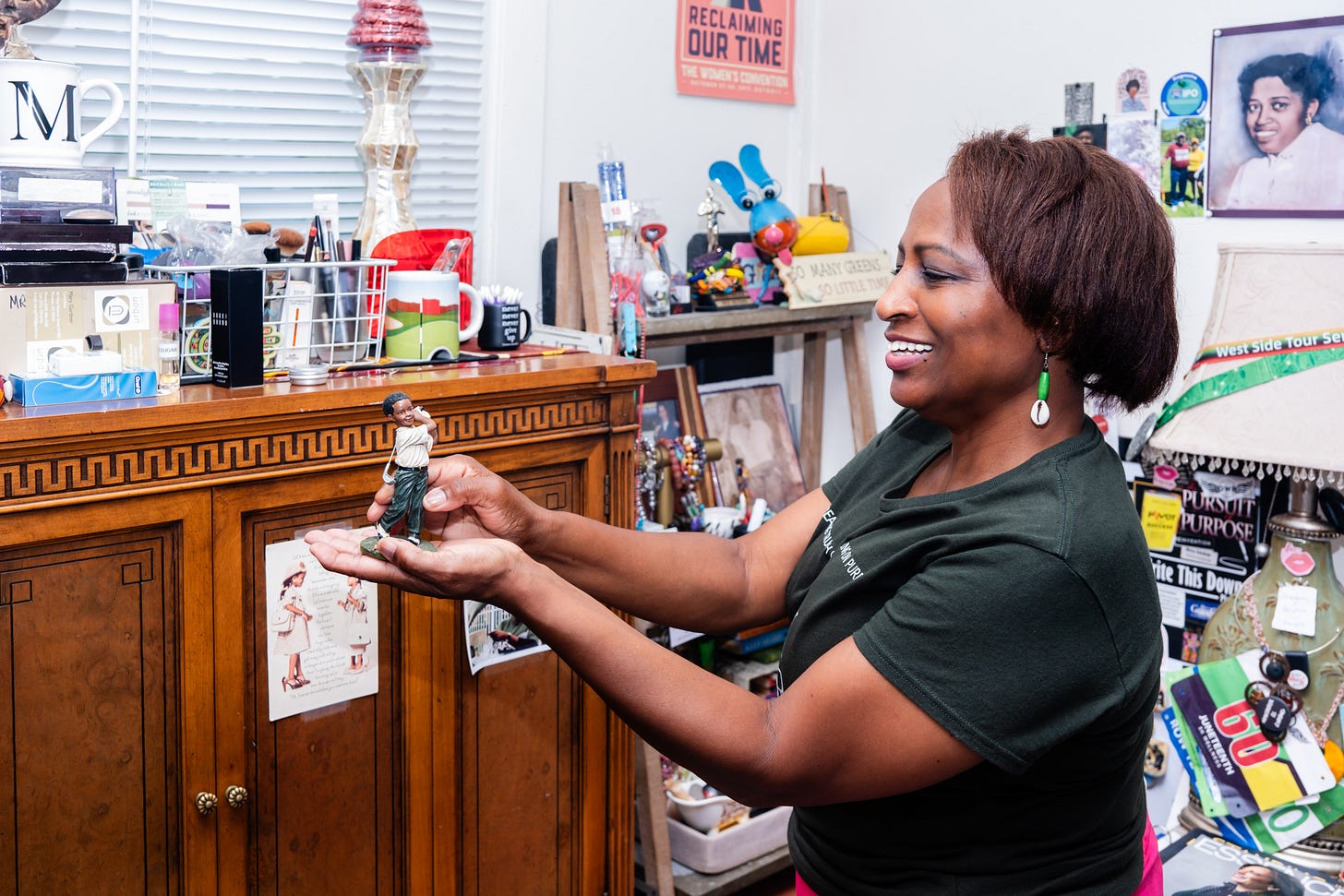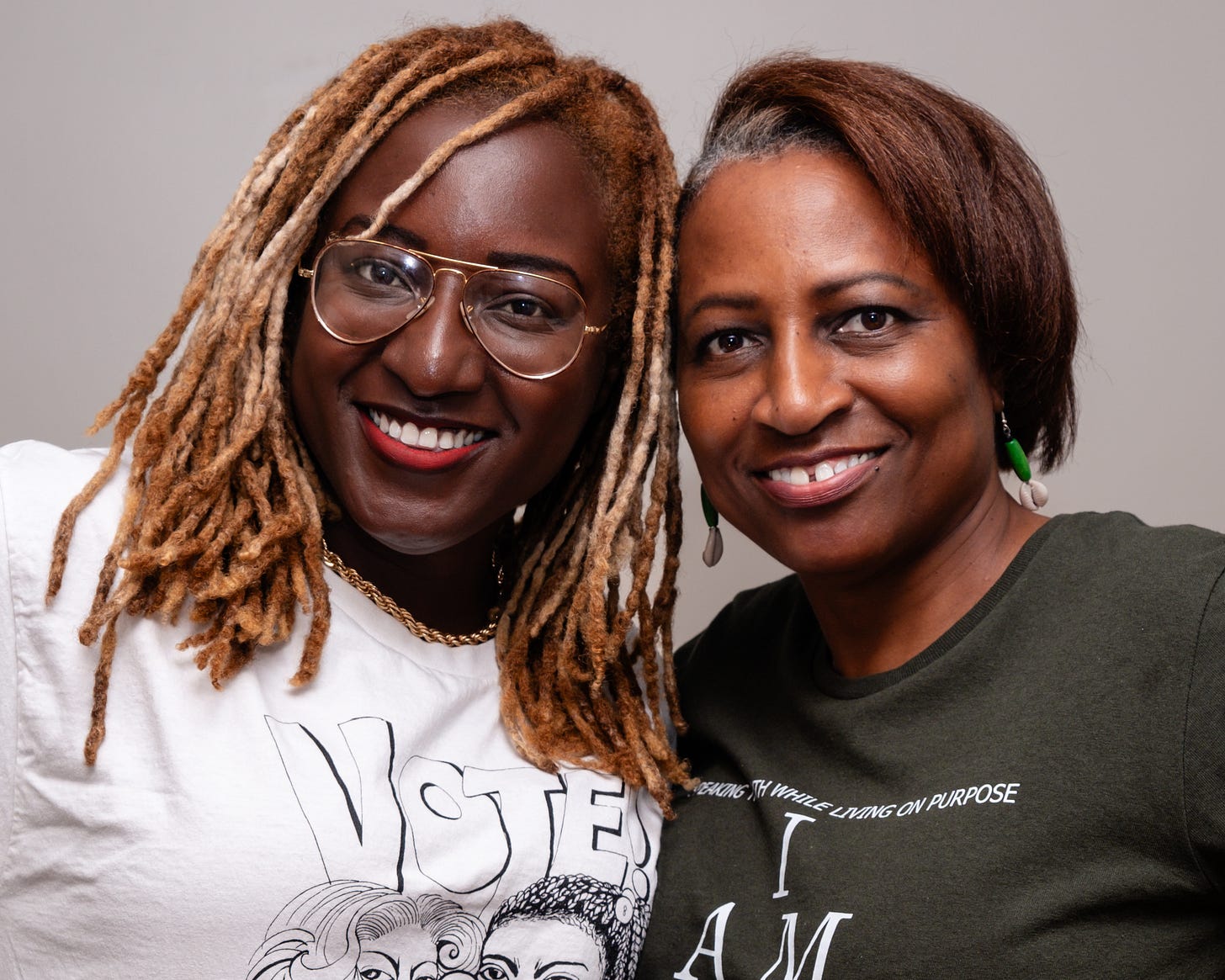"A Sister Still on a Mission"
Hailing from the Westside, community organizer and leader Mary R. Gardner keeps up the fight
Editor’s Note: This is one of the articles that appeared in Issue 0. We always knew that we wanted to have an in-depth profile, and we think that, once you finished reading this, you’ll see why Mary Gardner was an obvious choice. The piece was written in September 2024, before Mary Gardner was appointed to the Chicago Board of Education and before the presidential election. (What can we say? Getting Issue 0 out there took longer than we hoped)
Words by Francia Garcia Hernandez, photos by Kenn Cook
Many words could describe the drive that lives in Austin resident and community organizer Mary R. Gardner.
For more than 45 years, Gardner has been involved in the fight to better her community, women’s rights and freedoms, health care and childcare and voting rights, among other social issues.
In her own words, she is a “seasoned, flexible, energetic sister still on a mission.”
Along the way, Gardner also found her passion for golf. On the green, she learned that it is also a place where she can apply her organizing powers.
“I can drive the ball long off the tee. Imma get it down there,” she said.
In organizing, “give me the issue and I can organize it to the max. Give me a few pointers and I'm gonna package this thing real tough,” she said.
Gardner has been at the forefront of a long endeavor to improve life for Black Chicagoans and Black women in the city she calls home. She stood next to renowned civil rights leaders like Rev. Jesse Jackson, founder of Operation PUSH, and Rev. Clay Evans, pastor of the Fellowship Missionary Baptist Church and Founding National Board Chairman of the Rainbow PUSH Coalition, proving to be more than a helpful hand. She is an influential community leader.
For her, community organizing is “a no-brainer.”
“It’s about being active, knowing that you were engaged, hands-on and not just sitting off to the side, just making comments,” Garner said.
In a way, community organizing is part of the “family business.” Mary Gardner’s mother used to be involved in her community through her church as part of everyday life, setting an example for the young Gardner.
Joseph Gardner, Mary’s late husband and father of three daughters, was an Operation PUSH organizer and the aide for Mayor Harold Washington. He ran for mayor in 1995 and served as a commissioner at the Metropolitan Water Reclamation District of Greater Chicago, an agency that handles sewers and drinking water throughout the region. Their daughter, Crystal Gardner, is now the deputy political director for a local union.
As a young teenage mother, Mary became an intern for Operation PUSH, which later became the part of the National Rainbow PUSH Coalition led by Jackson. The experience showed her how “things are run” and she didn’t look back.
In the 1980s, she participated in her first campaign, protesting the appointment of three white women to the Chicago Housing Authority board by then-Chicago Mayor Jane Byrne.
When Gardner and her family first moved to the Westside in the 1980s, they faced rejection and name-calling for bringing the “kind of politics” that wasn’t done on the Westside. Undeterred, she joined the then-29th Ward Ald. Danny Davis’ reelection campaign. Davis was Mayor Washington’s major supporter as he faced off against a divided City Council.
“My first precinct I ever walked was with the alderman [Danny Davis] and we went door to door,” she said.
Ever since, Gardner has kept organizing and participating in what became a “natural” part of life: meetings, rallies, protests and walks.
“I’ve been doing that for so long, I forget that I’m doing it,” Gardner said.
Gardner also found a family within the movement. Rev. Evans and Rev. Jackson performed Mary and Joseph Gardner’s wedding ceremony.
She also saw the influence of leaders like Operation PUSH co-founder Rev. Willie Barrow.
“[She was] the leader who brought Black women into the reproductive rights fight nationally and locally, Gardner said. “She was the one that said this is a health issue. This ain’t just about abortions, this is about health care. From that point on, we’ve been engaged.”
The movement also exposed her to other women leaders who were actively engaged in government, politics, and entertainment, she said. Gardner strived to bring women to the areas where they aren’t well represented. That included golf.
“You don’t always see a lot of women playing and you don’t always see a whole lot of Black women,” she said.
In the more than four decades she has been an organizer, Gardner has been witness to some progress in the fight for civil and women’s rights. When she started being involved, pay equity and employment access for women were critical issues. Years later, she saw a wave of women elected to office.
“We were super excited when Carol Moseley Braun got that opportunity to run for the U.S. Senate [in 1992],” she said.
Ironically, at the time, Gardner worked for the incumbent Moseley Braun was facing off against, Sen. Alan J. Dixon. Braun decided to run against him because he was one of the 11 Democrats who supported the nomination of Clarence Thomas to the Supreme Court.
In the 1991 Senate confirmation hearings for Thomas, attorney and educator Anita Hill accused him of sexual harassment. Some senators accused her of lying, propelling a scandal that divided Americans who saw the Senate’s treatment of Hill as sexist and demeaning against those who accused her of lying. The year after, a record number of women were elected to office.
“[Dixon] votes for Clarence Thomas. Clarence Thomas now is a Supreme Court Justice. Anita Hill stuff is just going crazy. We mad as hell in Illinois, and they booted him out,” Gardner said.
Later, Gardner joined the Cook County Forest Preserve District, where she was a secretary for almost 20 years. She served on two Local School Councils in Austin. LSCs are made up of parent, teacher staff representatives, and they have the power to approve school budgets and work on improvements. Gardner was nominated to the Chicago Board of Education under Mayor Rahm Emanuel, but she was not appointed.
That work had its challenges, “but the flame never went out.”
In 2011, she made her run for Davis’s old 29th Ward seat against incumbent Ald. Deborah Graham, who was appointed to the seat a year earlier. While Graham won, Gardner wasn’t discouraged.
“Win or lose, I made the ballot. You know, I didn't win, but I never stopped,” she said.
When facing failure, Gardner reminds herself it is not the end of the road.
“It's actually not about the fall. It's about the get-up. Or some of us will say, the ‘giddy up,’” she said. “Just get up, brush yourself off and keep going.”
It is her faith, passion, and courage that keep her going. She strives for change while reflecting on what has been accomplished. When facing the unknown, she draws from a biblical scripture in the Book of Habakkuk that says “Write that vision down and see it through.”
“Sometimes I find myself engaged and I'm not sure how this is going, yet everybody’s rolling with Mary Gardner, so I say, ‘Okay, Lord, all right, we gonna do this,’” she said.
These days, Gardner does not work a nine-to-five job, but she is working on the issues that matter to Chicagoans, especially Westsiders.
She is determined to increase Black participation, leading voter registration drives and serving as deputy registrar on the Westside.
“I'd like to see us back engaged civically. We don't have to have a crisis. Let’s just get engaged and become informed about our issues before they become a problem,” Gardner said.
She is still involved in women’s rights and empowerment, celebrating the wins and fighting to keep moving forward. She co-organized the Westside Women’s March, a show of solidarity with the 2017 Women’s March on Washington. The march, a cry for protecting women’s rights and protesting Donald Trump’s presidential win, drew approximately a quarter million people downtown, according to the Chicago Tribune.
On the Westside, it was a show of “sisterhood with the city and the country” that proved women would stand powerful, united and undiminished after Trump’s victory over presidential candidate Hilary Clinton, who would have been the first U.S. women president if elected.
Since 2020, she has co-organized an annual event that recognizes Black women leaders who, like her, are working to improve the Westside. The “Ida B. Wells Women’s History Brunch” is a yearly event recognizing Black women leaders and activists held during Women’s History month.
Yet, she keeps her eye on the long game. In today’s national environment, where abortion bans are at the forefront of the Republican Party’s agenda, she is pushing for women to have autonomy and control over their bodies and guaranteed access to health care.
“'It’s a private decision,” she said. “It’s time to restore that back to being an option for everybody's daughter, sister and mom.”
Between meetings, calls and rallies, she practices golfing and invites others to join her, sharing her fire and contagious joy and drive.
This year, she celebrated her birthday on Austin’s Columbus Park golf course, a beloved neighborhood gem where Gardner started playing the sport.
“In golf, you're challenging yourself. You gotta practice, then you gotta play and then there's a set of rules. So golf teaches you so much,” she said.
In and out of the green, when obstacles come her way, she finds a way.
Gardner was out of state visiting her sister when Chicago police mistakenly raided social worker Anjaneatte Young in her home in 2019. Young was handcuffed naked in her house even after police realized they were at the wrong address, according to the Chicago Sun-Times.
While she personally did not know Young, Gardner was moved to take action.
“That could have been my door, that could have been your sister's door, your mother, your wife's door, that could have been your door, you know?” she said.
Gardner co-organized the march calling for police reform and justice after the botched raid outside the Chicago Police Department headquarters. While out of town, she found sign-making supplies at the local Home Depot and made woman-shaped signs with Young’s name, which she flew back to Chicago to participate in the protest.
Whether intentional or not, Gardner’s example has led her daughters to serve their communities from different arenas.
Her years of lived experience are reflected in her wisdom and observations, sometimes shared in meetings where her daughter Crystal is also a leader.
Organically, the Gardners have started an intergenerational bond that proves that elders and young generations have much to learn from each other.
When striving for change, listening and learning from one another is fundamental, she said.
“It amazes me sometimes because it does show just how much things are changed but stay the same,”
On the eve of a presidential election that could bring the first Black Asian woman to the White House, Gardner is excited to listen to younger generations as she participates in organizing and rallying efforts.
She also sees an opportunity to find the fire for the “second win,” the one needed when burning out and engage with those who have long been disengaged, especially at the local level. The agenda includes the upcoming Chicago Board of Education election – a first for the previously mayor-appointed board. Garner sees it as an opportunity to “repair damages” done to public education in the city.
In her own neighborhood, the effects can be seen in the low enrollment rates at Austin College & Career High School, which has seen programs disappear and staff shrink as enrollment plunged.
To Gardner, this is a reminder of why it is crucial to continue fighting for a better Westside.
“It’s something deeper; you don’t wait for somebody to validate you. It’s a faith walk in terms of continuing because there’s work to be done,” she said.
Francia Garcia Hernandez is the Southwest Side beat reporter for Block Club Chicago and host of CAN-TV show ¡Presente!. She covered the West Side for the past three years for AustinTalks, Austin Weekly News and Block Club Chicago, earning an Illinois Press Association award for coverage of the opioid crisis on the West Side. Francia co-created the Voices of Star Farm zine, a storytelling project that sought to capture what food justice looks like in the South Side’s Back of the Yards neighborhood.
Kenn Cook Jr. Is a Chicago-based visual artist renowned for his documentary and portrait photography. Inspired by iconic photographers like Gordon Parks, LaToya Ruby Frazier, and Devin Allen, Kenn blends artistic expression with storytelling to unveil the essence of humanity. His project #MyWestSideStory highlights the beauty of his neighbors.










